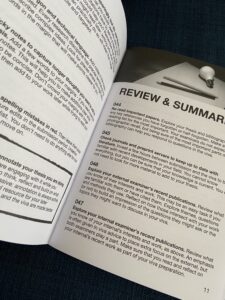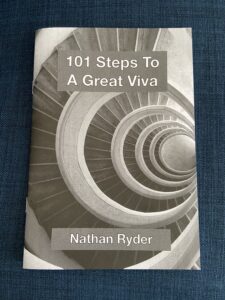My Two Questions
In the opening minutes of any viva session I ask two simple questions of the cohort:
When is your viva?
&
How do you feel?
Both of these questions, and their responses, are really helpful to me. I start to think about adapting the session I’ll present. I have a plan of course, but if I know that everyone has submitted their thesis then I know parts I don’t need to emphasise as much. If lots of people say they feel uncertain about their viva then I’ll find a few moments to talk about expectations.
My two questions help outside of viva prep sessions. Consider:
- When is your viva? Whenever it is, you have time. If you have days then you have time to work towards being ready. If you have weeks you can invest that time in slow and steady preparation if you want to. If you have months before submission then you can carefully build your confidence.
- How do you feel? Whatever you feel is not fixed. If you feel great then let’s cement that. If you feel uncertain then let’s help you with some information. If you feel unprepared you have time to work on that. If you feel nervous you’re not alone! Most candidates do and that’s OK.
Consider the time you have left and what you can use it for.
Consider how you feel and how you want to feel – and then decide what you will do as a result.
PS: One thing you could do is go to Kickstarter and back my campaign to print 101 Steps To A Great Viva! The campaign hit the target over the weekend so now I’ll definitely be producing the print run next month. If you want to make sure you get a copy – and possibly pick up some extra rewards for supporting the campaign – then please go and check it out.

